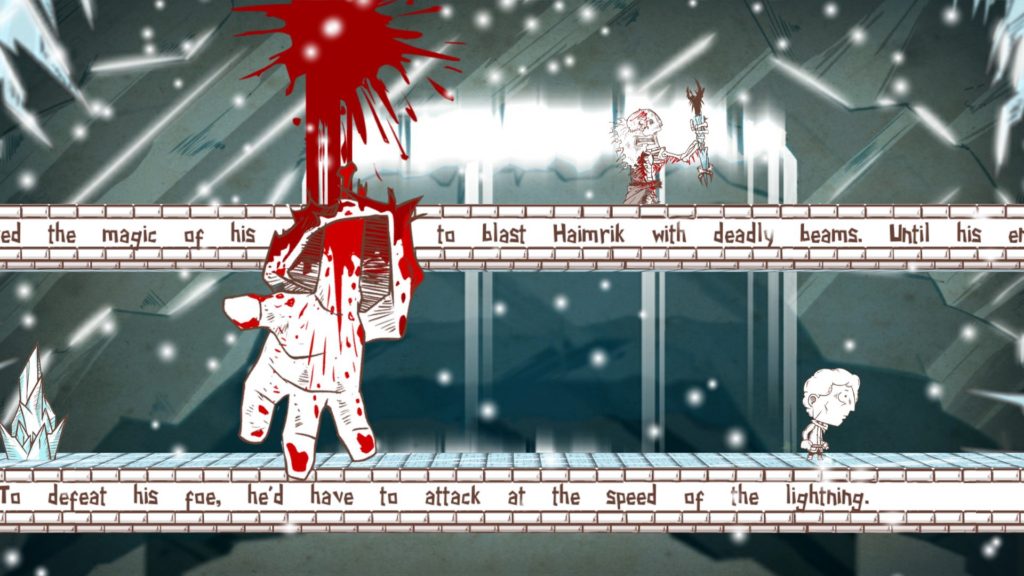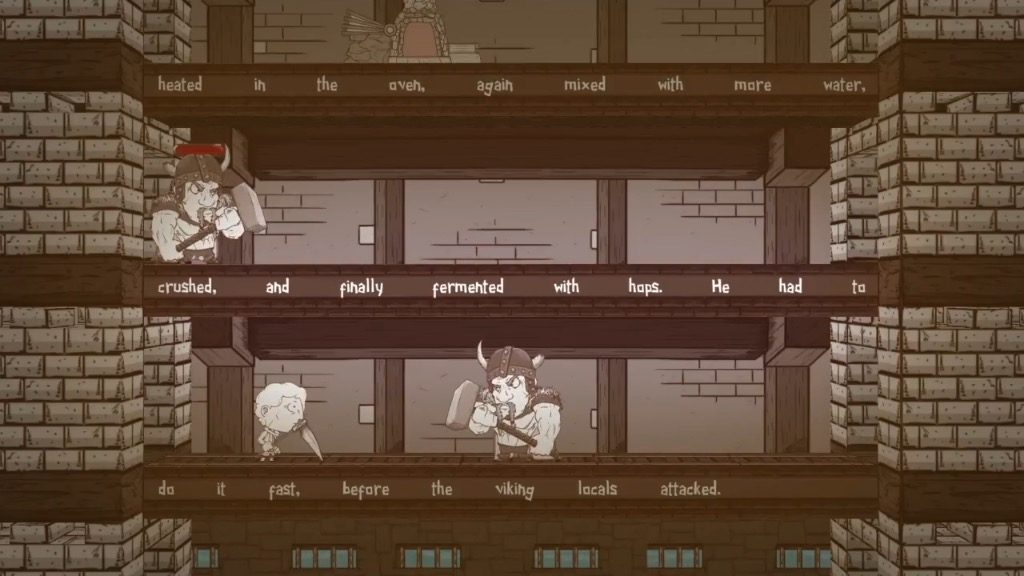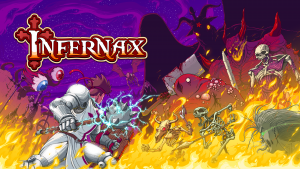
Ever the heard the pen is mightier than the sword? Well Colombian indie developer Below the Games has, and it seems they’ve taken it rather literally. Transporting players to a charmingly hand-drawn medieval setting, the studio’s newest 2D puzzle-platformer tells the story of Haimrik, a young and unassuming scribe who happens upon a magical book that grants him the very special ability of bringing words to life. Think Scribblenauts meets Castlevania and you’ll likely already have a pretty good idea of what this game has in store for you.
Gameplay is split across two distinct worlds. The ‘real’ world of Estria is where the bulk of the game’s narrative takes place, where we follow our eponymous hero as he embarks on a traditional zero-to-hero tale of adventure, romance and betrayal. After accidentally becoming the leader of a peasant rebellion, Haimrik sets out to overthrow a tyrannical King and battle the ruthless Word Warriors. Taking suitable inspiration from the style and structure of classic medieval fairy-tales, the game presents a charismatic take on a straightforward narrative formula; imbuing its traditionalist story with entertaining comic-style violence and a light touch of dark humour.

In the ‘real’ world we move Haimrik around a selection of trivial platforming/exploration segments as he chats-up local residents, trudges through underground tunnels and generally moseys about looking for his next objective. While this style of gameplay is necessary to introduce characters and advance the story, it is in the second ‘world’ where the game’s unique appeal lies. Frequently throughout the story, Haimrik will realise he needs a specific item to progress. Luckily all he need do is whack out his special tome, slit his wrist (blood is apparently needed to release the magic) and he will be ensuingly sucked into the world of the book; where he takes part in a little self-contained tale of adventure that eventually has him coming across the item(s) he requires.
Scenes (or ‘pages’) in the book’s world consist of a series of tiered platforms, each emblazoned with transcribed sentences that serve to narrate the adventure as it proceeds to happen. In order to progress, the player, as Haimrik, must side-scroll across each of these platforms, all the while harnessing the power contained within the displayed words to solve puzzles and defeat enemies. Is there an armed guard in your way? Easy, walk over to the word ‘sword’ and hold a button to summon a nice sharp blade to defend yourself. Need to open a door? Ah, look there’s the word ‘key’. Even in the beginning, when these puzzles are notable for their simplicity, you can’t help but marvel at the ingeniousness of such a dynamic.

Of course the game becomes considerably more entertaining once it trusts you enough to tackle more abstract problems. Before long you’ll be changing the weather, building bridges and conjuring all manner of useful items. Certain puzzles also begin to turn up the pressure; keeping the action moving while forcing the player to read further ahead so as to determine which words need to be interacted with on the way.
Boss fights likewise present additional challenges, each seeking to shake-up the predominantly linear gameplay and make the player work a little bit harder. While battling a giant dragon, for instance, Haimrik will be racing back and forth combining items, putting up barricades and dodging all kinds of fire-based attacks.

While the added difficulty serves to be a welcome feature, these fights are unfortunately where the game proceeds to lose a great deal of momentum. Figuring out how to combat the situation and using the knowledge you’ve amassed so far to identify the correct tactics is a blast, but unfortunately many encounters eventually succumb to a slog of trial-and-error based repetition. Haimrik doesn’t have a particularly sturdy health bar so expect to witness more than a few of his alarmingly gruesome ‘death’ animations – crushed, sliced, splattered, incinerated and sucked-dry-by-leeches are just a few of the ways our hero can meet an untimely end – upon which he is reduced to a bright red bloody splotch on the page and transported back to the beginning of the sequence. Since this tends to happen fairly frequently during boss encounters, said sections can quickly become dull and frustrating where you end up being repeatedly killed by your own ever-increasing impatience, rather than by a lack of understanding of the gameplay itself.

The hand-drawn 2D graphics are splendid and perfectly accommodate both the classic fairy-tale setting and light comical tone of the adventure. I especially enjoyed the sequences where the game switched to a 2.5D viewpoint, as this effect really gave the impression that you were playing through an actual story in the book. The chirpy soundtrack likewise compliments the light, offbeat tone, although it’s limited variations soon began to drone a little.
Similarly, the monochromatic sketchbook art style aptly suits the game’s concept, with the caricature sepia aesthetic amusingly juxtaposing the offhand cartoon violence. While entertaining in a sort of immature, Itchy & Scratchy-way, the excessive nature of the violence also makes the game hard to recommend to younger players, who I think the uniquely intuitive and humorous gameplay would be perfect for.

While the core wordplay dynamic is admirably original and addictive, it of course isn’t without its flaws. Obvious solutions to certain puzzles tend to remain elusive, for instance, purely due to a lack of mechanical clarity on the game’s part – one example being after I had to grow a carnivorous plant to eat an enemy soldier (no seriously), I spent the next 5 minutes trying to find a way to un-grow it before summarily realising I could in fact just casually stroll past it. The awkward console controls likewise occasionally bring out a certain sense of triviality in the game mechanics – the experience feels as if it’d be far better suited to a handheld or touchscreen platform. Various grammatical errors also remain scattered across many of the storybook levels. While these in no way affect the gameplay, they can cause the design to look somewhat messy and unrefined in places. That being said, the established effort apparent in the invention of such ingenious word-based puzzles – not to mention the fact that the developer’s first language is Spanish, not English – mean said errors are quite easily forgivable.
The most disappointing factor, however, lies in just how much more I feel the whole experience could have been. The puzzles, while certainly clever and enjoyable, almost exclusively involve looking for nouns to extract the items needed for progression. I couldn’t help but think the incorporation of more verbs and adjectives, playing around with homonyms, or even allowing Haimrik to rearrange sentences in order to reach certain words, would force players to think outside-the-box and consequently make for a more varied and satisfyingly challenging experience.
All in all, Haimrik offers a decidedly intuitive, uniquely entertaining and, most importantly, a wholesomely original gameplay experience. It’s story may be of the simple sort, and thus largely hinders any tangible sense of narrative engagement, but the dark humour and interesting, albeit somewhat restrictive, mechanics should be more than enough to satisfy any gamer willing to take a chance on this indie title. The £15.99/$19.99 price tag might be a little hard to justify – especially considering the game’s meagre length and awkward ‘handheld’ feel – but if money is no object, or you ever happen to spot it on sale, you could do much worse than this adorable little piece of indie-ingenuity.
Score: 7.1 / 10
Haimrik is available now on PS4, Xbox One and PC.







